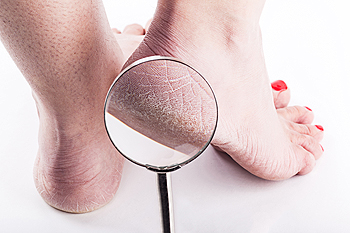
Mildly cracked heels are generally not a serious foot condition unless they develop into fissures, which may bleed and become infected. Cracked heels are caused by standing on hard or uneven surfaces for most of the day, or from wearing shoes that do not have a back. Flip-flops fall into this category, and it is beneficial to limit wearing these types of shoes. Patients who have existing medical conditions, such as psoriasis, diabetes, or a thyroid disorder, may be prone to getting cracked heels. One of the first signs that cracked heels may be developing is the hard, thickened skin surrounding the heel. This is referred to as a callus and can be yellow or brown in color. Cracks can form over the callus and can become worse when pressure of standing or running is exerted. Effective prevention methods can include washing and drying the feet daily, followed by applying a good moisturizer on them. If you have cracked heels that are causing problems, it is suggested that you speak with a podiatrist who can successfully treat this condition.
If the skin on your feet starts to crack, you may want to see a podiatrist to find treatment. If you have any concerns, contact one of our podiatrists from Grobowski Foot & Ankle. our doctors can provide the care you need to keep you pain-free and on your feet.
Cracked Heels
It is important to moisturize your cracked heels in order to prevent pain, bleeding, and infection. The reason cracked heels form is because the skin on the foot is too dry to support the immense pressure placed on them. When the foot expands, the dry skin on the foot begins to split.
Ways to Help Heal Them
- Invest in a good foot cream
- Try Using Petroleum Jelly
- Ease up on Soaps
- Drink Plenty of Water
Ways to Prevent Cracked Heels
- Moisturize After Showering
- Skip a Shower
- Keep Shower Water Lukewarm
- Don’t Scrub Your Feet
If you are unsure how to proceed in treating cracked heels, seek guidance from a podiatrist. Your doctor will help you with any questions or information you may need.
If you have any questions, please feel free to contact one of our offices located in Bellevue, Seattle, and Issaquah, WA, . We offer the newest diagnostic and treatment technologies for all your foot care needs.
